Photographs: Abhishek Mande/Rediff.com
Hours after Wednesday's blasts, Abhishek Mande visits the three sites at Dadar, Zaveri Bazaar and Opera House only to discover that there isn't a feeling of anger on the streets of Mumbai but rather a sense of deep hopelessnes.
In Dadar, the SK Bole Road -- one that houses the Antonio Da Silva High School and a long line of hardware and glass stores -- leads to what is called the Gol Mandir.
The Gol Mandir is an interesting place of worship. It has on one of its walls, a crucifix and among other deities the temple houses are statues of Lord Hanuman and Dattatreya that face eastwards away from the spot where the blasts took place. Their gaze is in the direction of a mosque situated across the road.
On Wednesday, while hundreds of passers-by were paying their respects to the various gods at the junction, an IED went off less than 25 metres away from this 'secular' circle. The bus stop where the device was placed was ripped. A little over 20 hours after the blast took place, the SK Bole Road has been cordoned. But it was business as usual on the streets.
Chaya Mohite, who works in a photo studio overlooking Kabutarkhana, which a few metres away from the Gol Mandir, said, "Everyone thought the blast happened in Kabutarkhana. That wasn't the case. I did hear the blast but we were not really affected," she said.
After the blast, Mohite's boss wanted to shut the studio for the day, but he was advised against it. Another employee, Shrikesh Prajapati, told me that the police insisted that the shop remain open. "If people saw shut shops, it would add to the panic," Prajapati said.
That was pretty much the case with all other establishments not just along Kabutarkhana but also along Ranade Road -- the street that runs parallel to the railway line -- and along all the smaller lanes connecting it to the station.
...
After blasts, Gol Mandir has become a tourist spot
Image: Gol Mandir, DadarPhotographs: Abhishek Mande/Rediff.com
"Bahut barish gira aaj," he pointed out. "Nahi toh koi farak nahi padta (It's a slow day because it rained heavily today. Else it wouldn't have made any difference)."
As on Wednesday, Shetty was manning the cash register at the restaurant when the 1993 blasts took place. "Woh bada blast tha (That was a huge explosion)!" he says. It happened further away from his restaurant (near Plaza cinema) but a left a far larger impact. He remembers a huge chandelier in his eatery being shattered to pieces.
This one he said was not such a big deal. Like everyone else he initially thought it was a gas cylinder that had exploded.
A day after the blasts, the Gol Mandir became something of a tourist destination. Hundreds of people were eager to see what's happening. The only thing visible to them was an empty road and a ripped bus stop.
Policemen stationed there occasionally made attempts to drive off the crowd. Most of these 'terror tourists' were passers-by. Some however had come from neighbouring areas 'just to see if everything is okay'.
It was 6 pm. On any regular day, the gates of the Antonio Da Silva High School would have been thrown open and young children would rush out, boundless energy spilling on to the streets.
But on Thursday, the huge iron gates were closed, the school empty. A watchman sat in a corner with no one to watch over. Occasionally, a policeman walked past the gates, perhaps to use the schools facilities. The school bell didn't ring and no student ran out of the gates.
'In Zaveri Bazaar, bomb blasts seem like a routine'
Image: Wednesday's attack was the third blast in Zaveri BazaarPhotographs: Abhishek Mande/Rediff.com
Facing these lights were two television journalists. They had rested their cameras on the barricades. It had begun to drizzle and one of them had innovatively used an umbrella to prevent the camera from getting wet.
The owner of a restaurant in the area said that this had become something of a routine for many people in the area. First there is a blast, then there's a flurry of activity and finally life goes back to normal. The market has been attacked once on March 12, 1993 and then on August 25, 2003.
He looked in the direction of the barricade, the crowd before it and the clean road beyond it and he sniggered, "I've never seen this road so clean. Never have I seen a sweeper in the area but today there were some four of them cleaning it!"
This was being done in anticipation of Prime Minister Dr Manmohan Singh and Congress President Sonia Gandhi's visit.
'We live under the shadow of Mumbadevi, she protects us'
Image: he name Mumbai is derived from the deity MumbadeviPhotographs: Abhishek Mande/Rediff.com
"Kya karega. Idhar hi jeena hai (What can one do? One has to live here)," he says coolly.
At a distance, Chetan Doshi and Usman Tayyeb were walking around as they usually did. Both are jewellers but neither has a shop. Doshi said they shared a room at the beginning of the Khau Galli with a handful of other merchants and they leave their wares in lockers.
"I don't go there very often but on Wednesday I was taking out some of my stock from the locker. This was in the afternoon. We were right near the Mumbadevi temple when it happened," he said. "At first we thought it was a cylinder," he added.
Clearly, the locals seemed undeterred by the blasts. When a restaurant owner in his mid 20s was asked if he was scare of living in the area his face broke into a tired smile and he said, "No. We live under the shadow of Mumbadevi. She is the one after whom our city is named. She protects us."
Policemen on duty for over 30 hours
Image: Policemen have been on their toes since Wednesday's blastPhotographs: Sahil Salvi/Rediff.com
The two VIPs visited patients in the Saifee Hospital, a stone's throw from the blast site. As they drove down with their cavalcade comprising over 60 cars, the tension in the air rose, as did tempers of the policemen. Every pedestrian was driven as far from the hospital as possible.
About 30 minutes later the cavalcade left, the policemen were at ease.
The blast site is a stone's throw from the city's most famous diamond market in the Panchratna Building that stood solemnly nearby and wore a desolated look.
An L-shaped partition keeps the site away from prying eyes. Somewhat ironically, the temporary partition is made of cloth often used to erect pandals for weddings and other auspicious occasions.
Three young policemen from the State Reserve Police Force were guarding the site. Blue and white plastic tarpaulin sheets were spread across the breadth of the road.
Two drums -- one made of plastic and another, smaller one made of solid steel stood innocuously in one corner. They were the only indicators of what happened a little over 24 hours ago the area. Just beyond the drums, underneath the plastic sheets, was a foot-deep crater that has been caused by the explosion.
The three policemen were in their late 20s. One of them Rajaneesh Kapadia (name changed) has been recruited only a year ago. All of them wore a tired look. They have been on duty for over 30 hours.
No anger, just a sense of hopelessness
Image: Opera House blast was the most powerfulPhotographs: Sahil Salvi/Rediff.com
Like the jawans he too had been at it since the Wednesday evening cordoning off the site and keeping nosey journalists at bay.
After a few moments' silence Patil ranted about hanging Kasab and raging a war against Pakistan 'once and for all'. As he looked in the direction of the drums he tells us how a WagonR saved the day.
"It just so happened that the car was passing by at the very moment when the bomb exploded. That saved at least 50 lives," he said.
Later, Kapadia said how bomb blasts such as these have now become a routine. There was no anger in his voice just a sense of hopelessness.
Unlike the television channels that had been talking about anger on the streets, it is this sentiment of absolute hopelessness and helplessness that was most prominent.

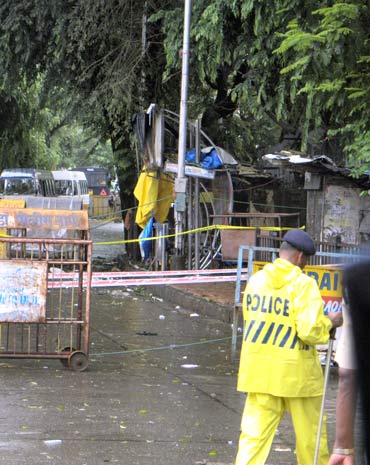
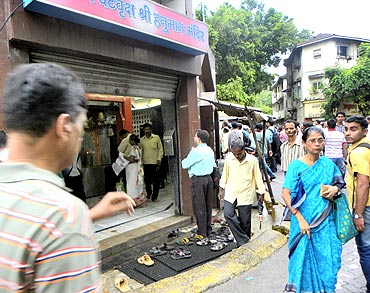
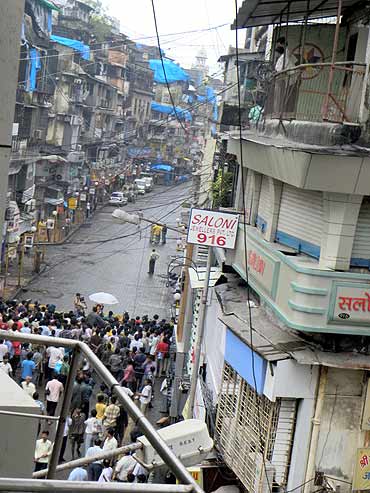
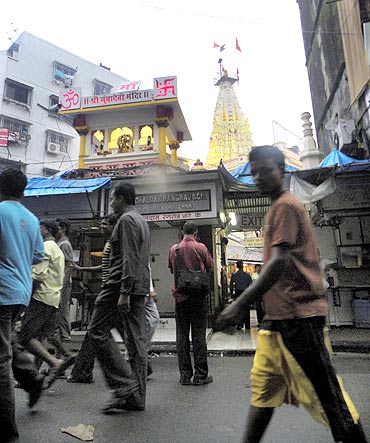
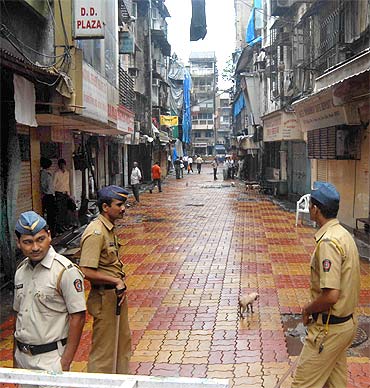
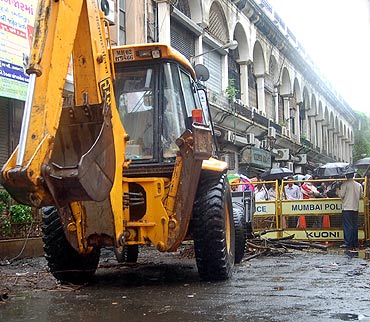
article